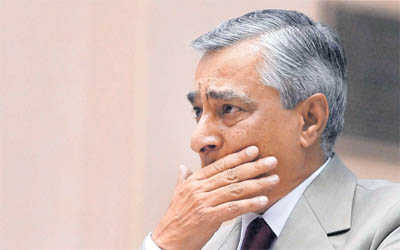The courts are overworked and undermanned. Infrastructure is being stretched to breaking point. Attaining justice, undoubtedly, unequivocally is a slow process —collecting evidence, presenting it and analysing it takes time. Now is the time to streamline the justice system to meet the challenges of a new world order

Chief Justice of India TS Thakur during his speech at the inauguration of Joint Conference of Chief Ministers and Chief Justices, at Vigyan Bhavan, New Delh. PTI
The functioning of the justice system of a country is an authoritative indicator of true socio-economic progress and equality. This reflects how well the values of the rule of law, equality and social progress are implemented. It also speaks, in somewhat quantifiable terms, of the situation in which a nation’s democratic values are upheld. India as a comparatively young nation has much to rejoice about. The judiciary has seen the nation through some very tumultuous times and has, for most part, come out victorious. The likes of the late Justice Hans Raj Khanna, and Justice V.R Krishna Iyer ensured that the judiciary commanded respect, not just within the country but through the world. There is, however, a big problem that we need to deal with if we are indeed to prepare ourselves as a global power. According to the National Crimes Record Bureau (NCRB), the total population in the country’s jails in 2014 was more than 4,18,000. The total capacity is however is a little more than 3,56,000. Out of these, more than 67 per cent of the population is undertrial. This is certainly an alarming number, especially as most of this population is under incarceration simply because they could not get bail. Presumption of innocence until proven guilty is the cornerstone of any civilised democracy. There are multiple reasons for this — among them the idea that an individual’s liberty is fundamental and to take that away, the state must go through the rigours of a fair trial. The most important impact of this is that individual liberty is guaranteed, except in limited circumstances. To ensure a fair trial and to guarantee this liberty, the Supreme Court has made its stance clear on numerous occasions. Before conviction an alleged criminal is exactly that — an alleged criminal. He has not been convicted yet and except in limited circumstances should not be deprived of liberty. It has been said that jail is an exception and bail is the rule. The ground reality is somewhat different. There have been numerous circumstances where undertrials have spent more time in jail awaiting trial than they would have had they actually been convicted. The reasons for this are many. One is the lack of easy access to justice. Uneducated and indigent undertrials do not always understand the rules. Ironically, people from such deprived backgrounds also happen to be the largest group of charged individuals. There is also the well-known problem of delays. The courts are overworked and undermanned. Infrastructure is being stretched to its breaking point. Attaining justice, undoubtedly, unequivocally is a slow process — collecting evidence, presenting it and analysing it takes time. However, the problem of delays in the justice system remain even if this margin of appreciation is granted. In a rather embarrassing situation, a court in London for instance agreed to hear a case against Taj Hotels in London (rather than in India) on the grounds that it would take far too long here. In order for the rule of law to be respected and for the legal system to have efficacy, appeal and authority, these problems need urgent solutions. The system needs to guarantee fairness, sensitivity and efficiency for the population to have faith in it. The Hon’ble Chief Justice has certainly raised this concern on numerous occasions. And this is certainly a time for the country to introspect and find solutions. With more than 3 crore cases pending, there is no easy way out. However, we urgently need to come up with and implement solutions if the faith in the system is to be restored. Vacant positions in high courts (more than 400 as of early this year) need to be filled. Technology needs to be exploited. Perhaps, most importantly, access to law needs to be widened and the population needs to be made aware of their rights as well as obligations. As a profession, lawyers too should consider removing rigmarole from court proceedings and simplifying terms. All stakeholders (investigating agencies, correctional services, prison authorities, etc) need to be considered part of a chain and meaningful interaction between them should be encouraged.We have come a long way and have developed a jurisprudence that is certainly world class. To meet mushrooming modern challenges and to ensure necessary confidence in the justice system it is essential that we act now.B.R. Ambedkar profoundly commented: “For a successful revolution it is not enough that there is discontent. What is required is a profound and thorough conviction of the justice, necessity and importance of political and social rights.” Now is the time to strengthen the foundations of the system to meet demands of a changing world and a changing order. The writer is Assistant Professor & Assistant Director, Centre for Penology, Criminal Justice and Police Studies, O.P. Jindal Global Law School.
